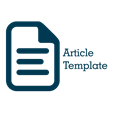The Analysis of CO2 Emission Reduction Scenarios in Industry Sector of Yogyakarta Province of Indonesia
DOI:
https://doi.org/10.18196/st.v14i1.568Abstract
The final energy demand and energy-related CO2 emission in industrial sector of Yogyakarta Province were analyzed in this study. The potential of energy saving and reduction of CO2 emission were estimated. The analysis was based on energy model. The model was constructed by LEAP model that describe the pattern of energy demand in industrial sector. Energy modeling and scenario analysis were used to simulate the impacts of various policies in energy demand and CO2 emission. Three scenarios were implemented in the model. Initially, the model was developed under business as usual (BAU) scenario that include current situation of energy-related activity in industrial sector. 2008 was selected as base year with projection period was terminated in 2025. Then, two alternative scenarios were developed that focus on energy efficiency improvement (EE scenario) and fuel switching to cleaner fuel (FS scenario). The two alternative scenarios were integrated into mitigation scenario. The result of alternative and mitigation scenario compare to BAU scenario in term of the final energy demand and energy-related CO2 emission. The result of the model showed the potential of energy saving by implementing mitigation scenario is 24.16% compare to BAU scenario. The expected reduction of CO2 emission under mitigation scenario is 20.22% compare to BAU scenario.
Downloads
Published
How to Cite
Issue
Section
License
Semesta Teknika is licensed under a Creative Commons Attribution 4.0 International License.
Authors who publish with this journal agree to the following terms:
- Authors retain copyright and grant the journal right of first publication with the work simultaneously licensed under a Creative Commons Attribution License that allows others to share the work with an acknowledgement of the work's authorship and initial publication in this journal.
- Authors are able to enter into separate, additional contractual arrangements for the non-exclusive distribution of the journal's published version of the work (e.g., post it to an institutional repository or publish it in a book), with an acknowledgement of its initial publication in this journal.
- Authors are permitted and encouraged to post their work online (e.g., in institutional repositories or on their website) prior to and during the submission process, as it can lead to productive exchanges, as well as earlier and greater citation of published work (See The Effect of Open Access).









